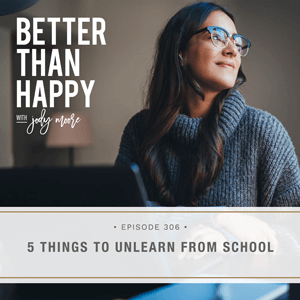Podcast: Play in new window | Download
 I’ve got five things I want to talk about that all of us were taught in school, but I want you to consider letting go of and leaving in the past. It’s debatable whether we should even have been taught these things in the first place, but at any rate, we’re going to unwind these five things and replace them with something more useful.
I’ve got five things I want to talk about that all of us were taught in school, but I want you to consider letting go of and leaving in the past. It’s debatable whether we should even have been taught these things in the first place, but at any rate, we’re going to unwind these five things and replace them with something more useful.
It’s important to note that this episode is not a critique of public schools and how our children are educated. Instead, I’m offering these thoughts that are often reinforced throughout our childhood simply so you can stop believing them if they’re creating a problem for you.
Tune in this week to discover some of the things we were taught in school that, as adults, we really need to start questioning. I’m sharing five things that may have served us as kids, and I’m dissecting them so you can see why we need to unlearn them. I find all of this so fascinating, so if you can think of any that I haven’t included here, reach out and share them!
If you don’t currently have a life coach, I would be so honored to be yours. I created a virtual coaching program called Be Bold that I want to invite you to join me in. We have group coaching, individual private coaching, and online chats along with hundreds of hours of courses and content that I’ve created just for you. If you’re ready to take this work to the 10X level, click here to check it out!
What You’ll Learn on this Episode:
- Why the idea that we should always “be quiet” does not serve us as adults.
- What we can actually learn from a tendency to procrastinate.
- Why you don’t need to try your very best all the time.
- What we’ve been taught about failure and why we need to forget it.
- Why working things out for yourself and never copying anyone else’s work doesn’t serve you as an adult.
Mentioned on the Show:
- When you’re ready to take what you’re learning on the podcast to the 10X level, then come check out Be Bold.
- If you’re a coach who is already certified through The Life Coach School, I want to help you take your coaching to the next level. Interested? Get on the waitlist here.
- Follow me on Instagram!
- Grab the Podcast Roadmap!
- Towards the end of this summer, I will be launching a business coaching program. To get on the interest list for when the doors open, click here.
-
Who Not How by Dan Sullivan
I’m Jody Moore and this is Better Than Happy, episode 306: Five Things to Unlearn from School.
Did you know that you can live a life that’s even better than happy? My name is Jody Moore. I’m a master certified life coach and a member of the Church of Jesus Christ of Latter Day Saints. And if you’re willing to go with me, I can show you how. Let’s go.
Alright you guys, I’ve got five things I want to talk to you about that are things you were taught at school that may or may not have been necessary to teach you when you were a schoolchild that I want you to consider letting go. We’re just going to leave them in the past. We’re just going to try to unwind the story or thought if you picked it up along the way and replace it with something more useful. Now, I want to be very clear that I am not publishing this episode as a critique of public schools, no, not at all.
I actually love public school. I love all the teachers who teach my kids, oh my gosh, they’re so amazing. I love the administrators. I do not envy the difficult decisions they have to make. I think that they’re doing an amazing job. I personally try not to criticize things unless I have a potential solution. And I do not have a potential solution. I hope that somebody will figure out how to overhaul our public education. And I think that we actually have made a lot of progress since I was a kid. But this is by no means a critique.
It’s a challenging job managing all those children, trying to teach them, people at different learning styles, different behavioral things going on. It’s a challenge. I simply am offering this to you because these are some ideas, or concepts, or thoughts that you might have been taught in many ways, but they were probably reinforced at school when you were a child. And I just want to give you permission to stop believing them if they’re creating a problem for you.
First thing that you might have been taught at school is that you should sit still and be quiet. Now, again I understand why we teach kids that. I don’t have a better solution. I am just saying a lot of you are minimizing yourself because you have this idea that you should be quiet, that you should sit still, that you should not disrupt other people around you. You shouldn’t ruin their experience. Now, there is a point at which maybe that’s useful. I’m all for us being respectful of one another. I’m all for us honoring other people’s desires when we choose to.
But I think that most of you, a lot of you anyway and myself included at times have so much more to offer. That if you let yourself explore what you’re interested in, if you stopped thinking I should sit still and be quiet, and be calm, and not bother anyone, not offend anyone, not ruffle anybody’s feathers. That I think there’s a lot of greatness within you that we would find on the other side of that. On the other side of you owning who you are.
If you like to move and you are big and loud, and disruptive at times I think that when used appropriately that could serve our world really, really well. We’re just not all wired the same. Some people have a hard time sitting still. And I think that’s coming from an amazing strength, whether we mean literally sitting still or sort of more metaphorically like not just going with the flow, not just keeping quiet, I think that that’s actually what adds a lot of richness, a lot of innovation, could make our world a pretty amazing place.
So don’t just sit still and be quiet. Make a ruckus, do it in a respectful way, definitely be legal about it, be ethical about it. You don’t have to be mad even to do it. I’m a fan of you actually doing it from a place of joy, and love, and compassion. But show up as your full self. Stop telling yourself that you should still and be quiet. You probably needed to do that when you were in first grade. You’re not in first grade anymore. You know how to do it in an appropriate way.
Okay, number two thing that you might have been taught at some point in school or by other well-meaning adults in your life is not to procrastinate. I’m super excited about this one. I just read a new book out by Dan Sullivan and Benjamin Hardy called Who Not How. A super good book recommended to me by a friend. This is a concept that Dan Sullivan teaches in this book that procrastination gets such a bad rap. But actually procrastination has a lot of wisdom within it.
Procrastination might be our own internal wisdom telling us that the task that we’re trying to make ourselves do is better suited to someone else. And I’m a big fan of this concept from Who Not How which is that if we did a better job of leveraging one another, leveraging one another’s strengths it would serve all of us. So I love the idea that procrastination is just your internal wisdom saying you’re not good at this, you don’t enjoy this. Someone else should be doing this thing instead of you.
Now, that doesn’t mean that you sometimes don’t just do it anyway, but don’t miss out on the wisdom that is available to you when you notice yourself wanting to procrastinate. Here is the other thing, I have gotten much better at planning over the years than I used to be but I still procrastinate. It’s just that the level to which I procrastinate becomes manageable when I plan.
So in other words I might have a big project and instead of doing everything for that project the night before, I plan out, okay, this needs to be done a week before, this needs to be done a week before that, this needs to be done three days before that. But still if there is a task that’s due a week before the big project is due, you know when I do that task? The seventh day before, I give myself a deadline of doing it a week before. I’m going to do it a week before. I’m not going to do it two weeks before. I’m still going to procrastinate till the last minute.
It’s just that I’ve mapped out my tasks to be manageable enough that I still can procrastinate because you know what? I just do sometimes. It’s just sort of in my nature to be like, “It’s deadline time. Here comes my genius. Now I can focus and do it.” So I just gave up trying to stop procrastinating. I just plan my time so that I can procrastinate and still achieve the objectives that I want to achieve.
And if that doesn’t do it then I’m really going to try accessing the wisdom I learned from Dan Sullivan which is procrastination is wisdom, telling you there’s somebody better suited to this job. Who is that person? How do we find that person? How do we get more people involved in helping us achieve our goals?
Okay, number three, oh man, I love this one. Number three and four sort of go together but I’m going to separate them out. So, number three is, do your very best, do your very best on everything. You need to just try your best on all of your assignments, all of your tests, all of your projects, try your very best at school. Now, listen, I’m all for you trying your best sometimes but I don’t think you need to do your very best all the time. I actually figured this out pretty early on when I was in college and they would start giving us a syllabus.
Remember the syllabus? Some of you were in college so you’re like, “Yes, we remember, thank you.” When I used to get a syllabus, this was before we all used the internet to the extent we do today. So it was a printed out five or six page document that would outline what we were going to do in the class. And it might give some expectations, and some rules, and guidelines. And it also included the assignments and tests and what each of them were worth point wise and how that would affect your grade.
And I’m not good at math, but I was good enough to do the math on those assignments and realize that I actually don’t have to do my best on every one of these assignments. I don’t have to get an A+ in every class. That’s not actually was not my goal in college. My goal was to get a certain grade, whatever grade I needed to get depending on the class and to have a good time, and to meet some people, and to live my life, and enjoy this time when I had some independence but not too much responsibility. I wanted to enjoy my time in college.
So I would do the math and realize, hey, I could get B’s on everything and still do well in this class. Or I could just not turn in one assignment and still get the grade I want to get in this class. Or maybe I don’t need to do my very best on these assignments and on those assignments I could just do the bare minimum as long as I just turn it in. I still get the grade I need to get.
Now, some of you are dying as I say this. You’re just cringing, I know it. Here’s the thing, I want you to keep in mind what your objective is, what it is that you’re trying to do. I was not trying to get into an Ivy League master’s program. If I was, I might have needed to do my best on everything. I wasn’t. I was just trying to get my degree and get on with my life. And like I said, a very important part of my objective at college was to enjoy myself, to make good lasting friendships, and relationships, and experience all the amazing things that college has to offer.
And so it was a conscious decision to not do my very best on everything. Do you see what I’m saying? You don’t actually have to do your very best all the time you guys, you really don’t. If you want to, great, but make sure you have a good reason. Make sure it’s not to prove something to someone else. Make sure it’s not to prove to yourself that you’re worthy and valuable because you already are. You don’t have to do your best on anything for that to be true. Your job is to understand that and to work to believe that. And to understand that other people’s opinions are not yours to manage.
And to decide instead, what is my objective? What do I want to achieve here in my life? So that’s number three. Now, like I said, number three and number four sort of go together.
Number four thing that you might have learned at school is to not fail. That was the worst thing that you could do outside of misbehave I guess, but equally frowned upon was failing. Don’t fail. And I tell my kids this all the time. I tell them, “Look, I’m glad you’re doing well at school. I’m glad you’re getting good grades. I am glad that you’re learning but there are going to be times in life when failing is not only okay, but actually necessary.”
So just be careful, don’t tell yourself that you shouldn’t fail because when you get into the real world, when you go to try to get a job, you know what you’re going to have to be willing to do? Fail. And you’re starting to get this idea at this young age as we mostly all do that failing is bad. And I want you to know that’s not true. Failing is not bad. Failing just is the way.
The way you’re going to get a job is by failing at getting a job first. You’re going to have people not reply to you when you apply. They’ll just ignore you. They won’t even do you the favor of saying, “Thanks, we got your application but you’re not the right fit.” They just won’t even reply. Then you’ll have some people that will reply and they’ll tell you you’re not qualified. And you’ll have other people that will interview you and they’ll say, “Thanks, we really liked you but we don’t feel like you’re the right fit.”
And you’re going to fail, I don’t know how many times, maybe a lot of times before you’re going to find a job. And that’s the way you find a job. It doesn’t mean something’s wrong. Very rarely does someone just go out, pick out one job, apply, and get it, and live happily ever after. It’s just not the way of it.
And you’re going to fail in relationships. You know how you find the person you want to marry? You date a whole bunch of people that aren’t the person that you’re going to marry, either you don’t want to marry them or they don’t want to marry you. Or you guys just maybe thought you were going to end up together but it turns out you don’t get along. And you could call that failing.
Again, any of these things, failure’s just the label, failure is a thought. We could say it’s not a failure, any of them. But if your brain makes that mean that that was a failure then okay, I’m in for failing. Let’s go. Certainly if you’re going to build a business you’re going to fail. You’re going to fail over and over again. That’s the way to succeed. So just be careful because school teaches you not to fail.
And I tell my kids, “Listen, if you’re failing because it’s too hard, you’re not able to succeed yet, or you haven’t found the right path, or you just don’t know how to do it well enough. I love that. I want more of that for you. I want more of that kind of failure. If you’re failing because you just didn’t show up for yourself. Alright, let’s take a look at that. That might not serve you. But if you’re failing because it’s too hard, perfect. I want you working in the zone of this is too hard. That’s how you grow. That’s how you learn. That’s how you achieve.”
Okay, fifth and final thing that you might want to unlearn from school is that you should just do your own work. Don’t look at your neighbor’s paper. Don’t copy what they did. Don’t ask for help. See if you can do it on your own. Maybe it’s appropriate at times, maybe it’s even appropriate in school, but in the most of the rest of your life, not necessary, not going to serve you. You know what? Don’t do your own work. Get someone else to help you, ask other people.
Again I really do think that in my business, this is one of the things that’s helped me really succeed is I don’t ever think I have to figure it out on my own. I always know there is somebody ahead of me, there’s somebody smarter than me, better than me at this thing and I’m going to go learn from them. I’m going to ask them how to do it. Do you know what’s true? Many times they already want to tell me how to do it.
How do I run Facebook Ads? I don’t know. It’s just so hard. Okay, you know what? There are people who are really good at Facebook Ads and they want to teach me how. Some of them are giving free information away so I start there. And then sometimes I pay for courses, or coaching, or help, or something, services to get help with Facebook Ads. I’m not going to try to do it on my own. I’m not going to do my own work. I mean I could do a little bit of it but I can’t get to where I really want to go without getting help from others.
I mean really, it’s not your job to be a solo person. I don’t think that’s what actually the Lord wants for us. I don’t think that’s meant to be our earthly experience, to just come here and figure everything out on your own. No, I think you’re meant to come here and figure out how to rely on one another, not just to see what you can take from them, also what can you give, what can you offer to others. But don’t try to do it on your own, work with other people. Leverage the genius that other people have, leverage their experience and ask for help.
Again, we’re not just out to try to grow a business. We’re not just out to try to achieve our own goals. We actually want to enjoy our life and a huge part of how we enjoy it is the connection that we have with other people. So working with other people is not just a means to achieve your goal. It’s actually the way to live the life that you’re probably going to want to live.
But in school you were taught to sit at your own desk and stare at only your own paper and try to answer all your own questions. But in life that’s not the way, you get to phone a friend, you get to ask for help and I highly recommend that you do. And this is again not just your own business. I know I’m using business as the example, but this is true in your personal life too. Who can you ask for help? Who’s better at it than you? Who could you hire or recruit, not just ask for ideas? I mean yes, ask for ideas, but also who could you get to do the things that you don’t like doing?
I’m telling you guys, do your own work is probably not a useful thought for you if you’ve graduated from high school, maybe even while you’re in high school. Be ethical, yes, be honest, I’m not talking about stealing other people’s work and claiming it as your own. I’m talking about working with others.
Alright, did I forget any? Do you guys have other things that we learned at school that maybe we want to just bring up and question and we want to unwind, we want to notice how they’re not serving us anymore? If so, I would love so much if you would come and share them on Instagram with me.
We’ll do a post, we always do a post associated with every podcast episode, it’s either a quote or an image. And I would love so much if you would share. I’m sure there are other things we learned at school that we might want to unlearn and I want to hear what they are. So share them in the comments on Instagram. Thank you for being here today, have a beautiful rest of your week. Bye bye.
Who is your life coach? If you don’t have one, I would be so honored to be your coach. I created a virtual coaching program called Be Bold that I want to invite you to join me in. We can address challenges, we can work on goals, and we can do it in so many different ways.
We have group coaching, individual private coaching, and online chats along with hundreds of hours of courses and content that I’ve created just for you. When you’re ready to really take what you’re learning on the podcast to the 10x level, then come check out Be Bold at JodyMoore.com/membership.
Enjoy the Show?
- Don’t miss an episode, follow on Spotify and subscribe via Apple Podcasts, Stitcher or RSS.
- Leave us a review in Apple Podcasts.
- Join the conversation by leaving a comment below!






